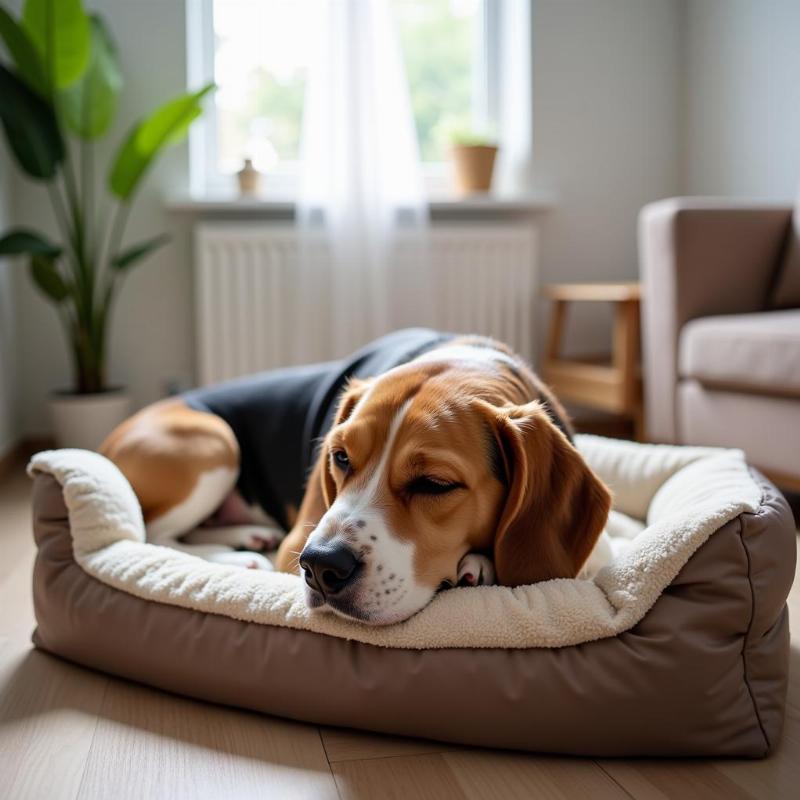If you’ve ever woken up to find your dog panting, you might be wondering if it’s normal or a cause for concern. While occasional panting upon waking can be harmless, frequent or excessive panting could indicate an underlying issue. This article will explore the various reasons why your dog might wake up panting, covering everything from normal physiological responses to potential health problems, offering practical advice and insights for concerned dog owners in the US.
Normal Reasons for Panting Upon Waking
Just like humans, dogs can experience physiological changes during sleep that may cause them to pant briefly upon waking. For instance, if your dog was dreaming, especially an active dream involving chasing squirrels or playing fetch, they might wake up with a slightly elevated heart rate and breathing, leading to panting. Similarly, a warm room or a snuggly blanket can increase body temperature, causing your dog to pant as a way to cool down.
If your dog’s panting subsides quickly after waking and they appear otherwise healthy and comfortable, there’s likely no cause for alarm. However, persistent panting, accompanied by other symptoms, warrants further investigation.
Panting Due to Underlying Health Issues
While occasional panting can be normal, persistent or excessive panting, especially when accompanied by other symptoms like lethargy, loss of appetite, or changes in behavior, could signal an underlying health problem. Some potential medical reasons for panting include:
- Respiratory Issues: Conditions like pneumonia, asthma, or kennel cough can make it difficult for your dog to breathe, leading to panting.
- Heart Problems: Heart disease can impair the heart’s ability to pump blood efficiently, causing shortness of breath and panting.
- Pain: If your dog is experiencing pain, they may pant as a response to discomfort. This could be due to arthritis, injuries, or other medical conditions.
- Anxiety or Stress: Just like humans, dogs can experience anxiety and stress, which can manifest as panting. Changes in routine, loud noises, or separation anxiety can all trigger panting.
- Heatstroke: This is a serious condition that requires immediate veterinary attention. If your dog is panting heavily, has a rapid pulse, is drooling excessively, and seems disoriented, they may be suffering from heatstroke.
What to Do if Your Dog Wakes Up Panting
If your dog frequently wakes up panting or the panting seems excessive, it’s crucial to consult your veterinarian. They can perform a thorough physical examination and run necessary tests to determine the underlying cause.
- Observe for Other Symptoms: Pay close attention to any other symptoms your dog might be exhibiting, such as coughing, sneezing, lethargy, loss of appetite, or changes in behavior. This information will be helpful for your veterinarian.
- Provide a Comfortable Environment: Ensure your dog has a comfortable and cool place to sleep, especially during warmer months. Provide fresh water at all times.
- Manage Anxiety: If you suspect anxiety is the cause, try to identify and address the source of stress. Creating a calm and predictable routine can help reduce anxiety. Consult with a certified dog trainer or veterinary behaviorist for guidance.
When to Seek Emergency Veterinary Care
If your dog’s panting is severe, accompanied by other symptoms like collapse, difficulty breathing, or bluish gums, seek immediate veterinary care. These could be signs of a life-threatening condition.
 Dog Resting Comfortably
Dog Resting Comfortably
Conclusion
While occasional panting upon waking can be normal for dogs, persistent or excessive panting warrants further investigation. By understanding the potential causes and observing your dog closely, you can help your veterinarian determine the best course of action. Don’t hesitate to contact your veterinarian if you have any concerns about your dog’s health.
FAQ
- Is it normal for dogs to pant while sleeping? While less common than panting upon waking, some dogs may pant softly during sleep, especially during active dreams. However, loud or persistent panting during sleep should be checked by a vet.
- How can I tell if my dog’s panting is serious? If the panting is heavy, prolonged, accompanied by other symptoms like lethargy, loss of appetite, or difficulty breathing, it could be a sign of a serious issue.
- Can pain cause panting in dogs? Yes, pain can trigger panting as a physiological response to discomfort.
- What should I do if my dog is panting heavily and seems disoriented? Seek immediate veterinary care, as these could be signs of heatstroke.
- Can anxiety cause panting in dogs? Yes, anxiety and stress are common causes of panting in dogs.
- How can I create a calming environment for my anxious dog? Establish a predictable routine, provide a safe space, and use calming aids like pheromone diffusers or calming music.
- Should I give my dog water if they are panting excessively? Offer small amounts of cool water, but don’t force your dog to drink if they are reluctant.
About Beautdogs.us
Beautdogs.us is your premier online destination for all things dog-related in the US. We provide expert advice on dog breeds, care, training, and the latest pet trends. Whether you’re a new dog owner or a seasoned pro, Beautdogs.us is your trusted source for comprehensive and engaging information on canine companionship and care. We offer expert guidance on breed selection, nutrition, grooming, training, and overall well-being. From puppyhood to senior years, we’re here to help you navigate every stage of your dog’s life. Contact us at [email protected] or call us at +1 501-555-7529 for more information.